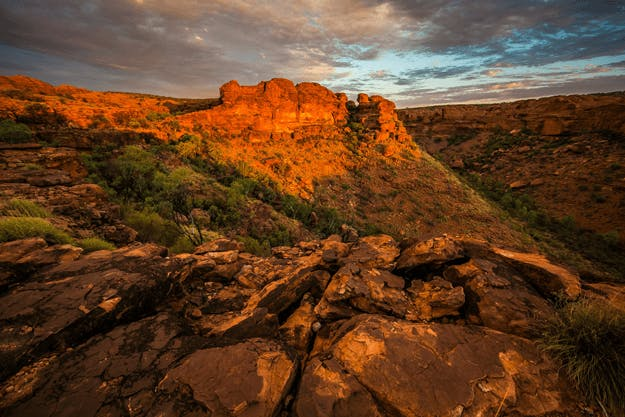
If you live in Arizona, good job! You’re in one of the fastest growing states in the U.S. Sure, there’s probably a bit more sun than you’d like. The suntan lotion flows like water from the heavens — which, consequently, you probably wish you had more of. That’s ok. You can still brag about your growing housing market, beautiful desert scenery and historic sites. But we all know what happens when a state gets popular, right? Of course we do. People move in. People! And there’s nothing that spoils the peace and tranquility of a beautiful state and its wonderful cities more than people. Most are fine. You’ll love your new neighbors. But mixed in among the smiling and happy faces of your soon-to-be BFFs are those that would rather steal your stuff. Burglars are everywhere, and Arizona’s increasing population only means one thing: Home security in Arizona is more important than ever.
Home Security Provider Requirements for Arizona
Arizona residents, we know your head is spinning about a lot of things. The dry desert air can definitely get into your brain sometimes. It precludes rational thought and makes you do things you wouldn’t otherwise do. Such as burglarize a home, for example. Thankfully, your crime rates are not as high as many other states, but we’re not letting you off the hook. Arizona still has crime rates higher than the national average. We’re not blaming everyone, of course. Most Arizonans are true, red-and-blue blooded Americans, looking out for themselves and their fellow man. But that criminal element exists, and so, too, does an industry built around helping the more innocent among us protect our precious belongings. That includes whether we’re at home or out of town.
In 2013, something clicked in the minds of those whose responsibility it is to ensure Arizona is a safe place. “Hey guys,” they thought, probably. “Why don’t we pass a law requiring home security providers to, you know, be registered and fingerprinted?” That brilliant idea (we make no claims that it went down that way) materialized into a short, succinct law that does just that. Home security providers in Arizona must be licensed, the process of which requires an application, fingerprinting, successful work history in the field, and the names and addresses of any and all employees.
There are, of course, good reasons for this. Arizona’s population increase has, understandably, coincided with a rise in burglaries that has somewhat outpaced the actual population gain. We’re not saying it’s unsafe to live in Arizona, of course. But the home security business in Arizona is growing right along with the population size. It only makes sense to regulate the industry a bit more.
As usual, the state government has lagged behind city governments on this end. Cities in Arizona noticed the need for home security provider rules and regulations earlier, though not necessarily as soon as citizens in the state. However, as is common, this also means they’ve given homeowners a bit of a clamp down as well.
The second largest city in the state, Tucson, crafted their own alarm company license requirements back in 2005. The rules are strikingly similar to what now exists on the state level in some ways, while taking a hard line on both users and companies. Not only did Tucson draft this document to help improve the quality of services provided by home security providers, its creation was also “to ensure that police department personnel will not be unduly diverted from responding to actual criminal activity as a result of responding to false alarms.” Ok, so we added the emphasis on the word “actual” there, but admit it. You read it that way too.
Much like Florida and Alabama, Tucson’s regulators a just a bit concerned about criminals who might want to use a job opportunity in the home security business as a launching pad. As such, Tucson and other cities require agents (those employed by the company) to be free and clear of any criminal convictions within the past 5 years. This even includes serious driving convictions! In many ways, home security providers in Arizona need to be of a higher moral standing than doctors, teachers or lawyers in the state.
Many cities in the state — in particular, the big four: Phoenix, Tucson, Mesa and Scottsdale — all have similar licensing requirements. Much like Arkansas with its neighboring states, these cities have reciprocity agreements with each other. Any home security provider licensed in one of those cities can transfer that license to another city. Unfortunately for security providers, they must be licensed, not only in the state, but also in each individual city where they do business. Residents can at least sign their home security provider’s contracts with full knowledge that the company had to jump a few hurdles to even provide its services.
Erecting Home Security Cameras in Arizona
Arizona is an interesting place and this holds true for its recording laws. Home security cameras in Arizona are a fairly simple matter: Put them up! While Arizona is one of many states that does require consent when using audio recording devices, some allowances are made for home security cameras monitoring certain individuals.
In Arizona, you cannot legally record people in private settings. This holds true pretty much anywhere. This means that, no, your neighbor sunbathing in their backyard is not technically in “public”, and your neighbor showering is definitely in a private setting. So while you might be walking a fine line for having a security camera pointing to your neighbor’s back yard, you’re definitely in the red zone when it comes to your neighbor’s bathroom window.
But what about your own house? Well, that’s where things become interesting. In Arizona, there’s leniency for home security cameras that are meant to, well, protect the home. Despite the illegality of picking up audio for conversations you weren’t invited to, certain types of people are not included in this. That includes nannies, gardeners, anyone doing repair work inside your home, nursing assistants, etc. If someone is doing work inside of your home, by law, they are allowed to be recorded, both audio and video.
Not so fast, however. Even those doing work in your home have a right to privacy. Bathrooms are about as obvious as it gets here, as well as certain, more intimate settings such as bedrooms. Burglars, however, have zero privacy in your home. This includes audio and video recording. In all, Arizonans have it good when it comes to video surveillance. Your home can be protected with cameras, as long as you’re not creepy about how you use them.
Safety During Natural Disasters
Heat. Heat. More heat. That’s what Arizona is all about. It is, after all, primarily arid. Why anyone decided that a desert was a great place to live is anyone’s guess. However, Arizonans have somehow made an oasis in the desert and made it work. Nevertheless, nature fights back when it can, and that can sometimes mean disaster. Sometimes. But really, if you’re looking to be safe from just about everything man vs nature, Arizona is going to be your go-to state.
The Grand Canyon State is not prone to many natural disasters. It’s too far away from the water for hurricanes. It never gets major snow storms. Even tornadoes usually shy away. Its proximity to California might make you believe earthquakes are a concern, but Arizona is rather far from most major fault lines. So what do Arizonans have to worry about most? Extreme heat. Heat can creep up on a person, and it can take lives faster than many would expect. During the next heat wave, make sure you’re prepared.
Surviving extreme heat in Arizona is all about two things: Keeping cool and staying hydrated. There are few people in Arizona who know a day without air conditioning. Without it, the desert would likely never have been fully tamed. But what if the power goes out? This is where shade and water come into play. Always make sure you keep plenty of fresh, potable water handy and tucked away for emergencies. Know the signs of dehydration and of heat stroke. Remember that heat rises. Stay in the lower levels of your home, and keep windows and shades drawn to block out the sun.
Sweating is both good and bad in heat. It helps cool the body down, but it also accelerates water loss. Wear baggy and light clothing. If your A/C dies, go to a public location where it’s still working. Beat the heat. Live to tell the tale to your great-grandchildren.
Despite the dry weather and hot sun, Arizona is almost unmatched in its beauty. The state’s population growth and job growth are indications of a bustling economy, ready to take in more residents at any time. Just keep your doors locked and invest in a good home security system, Arizona. Keep those burglars locked outside in the hot weather.

